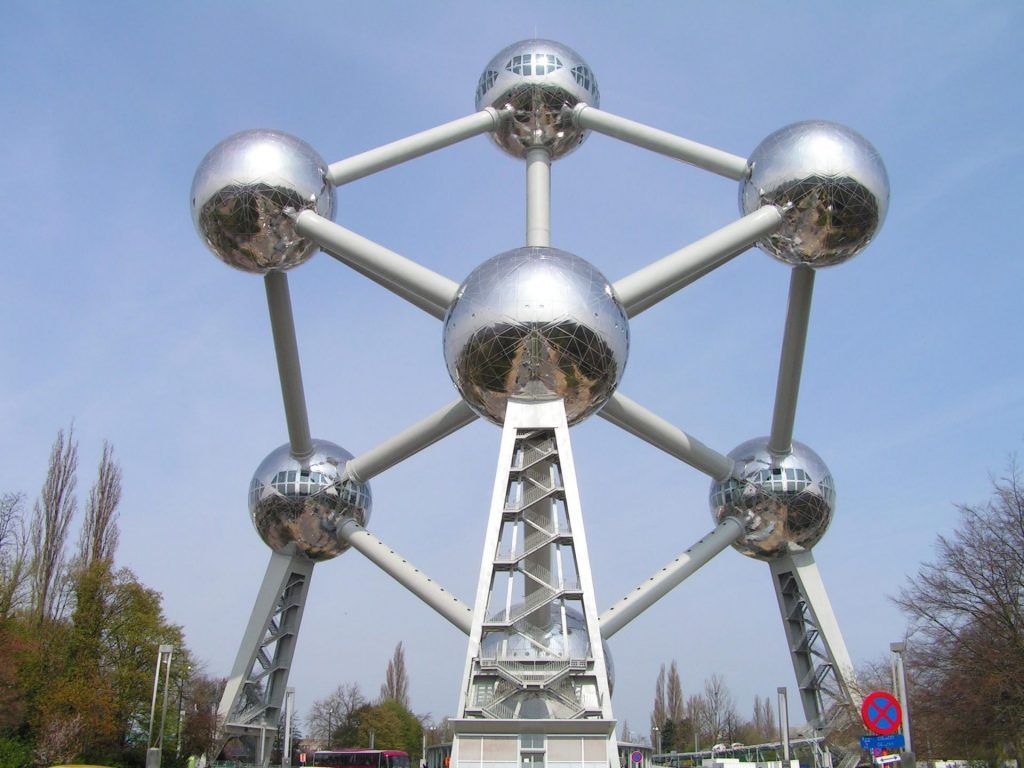Nuclear Brexit
By Hugh Gusterson | June 30, 2016
 Built in 1958 for the World's Fair, the "Atomium" sculpture has become a symbol of Brussels and things nuclear in Europe — and to some extant, a symbol of the EU itself. Image used under Creative Commons license.
Built in 1958 for the World's Fair, the "Atomium" sculpture has become a symbol of Brussels and things nuclear in Europe — and to some extant, a symbol of the EU itself. Image used under Creative Commons license.
Editor’s note: Considering the latest news about Brexit, we thought it appropriate to reprint this Hugh Gusterson Bulletin essay from 2016, which deals with an often-overlooked aspect of Britain’s possible departure from the European Union.
Those who voted for a “Brexit,” with the avowed goal of “making Britain great again,” may have set in motion a course of events that will result in Britain’s unilateral nuclear disarmament.
For those who favor disarmament, this would be good. For those who hoped Britain’s departure from the European Union would restore its glory on the world stage, it presumably would not.
Much of the public commentary on the prospective fallout of Brexit has focused on the anticipated damage to global markets, the probable shrinkage of British gross domestic product in the years following withdrawal from the EU, and a possible domino effect within Europe as other populations, incited by the British example, mobilize against the Brussels bureaucrats.
Insofar as pundits have speculated about the international security implications of Brexit, they have pointed out that British diplomats will be so focused on renegotiating trade agreements with the rest of the world that they will devote fewer resources to the turmoil in the Middle East and simmering tension with Russia, and that Britain will therefore be a less reliable ally for the United States. (This partly explains why Russian President Vladimir Putin greeted Brexit with a grin.) They assume, though, that Britain will remain strongly committed to NATO.
One problem with this assumption is that the UK may no longer exist as a country within a few years. It looks likely that, if Brexit proceeds, Scotland will withdraw from the United Kingdom, and there is a possibility that Northern Ireland will follow suit. In 2014, in a referendum on secession from the United Kingdom, 55 percent of Scots voted to stay and 45 percent voted to leave. But the subsequent referendum on leaving the EU has pushed many Scots to reconsider their position on Scottish independence. In the Brexit referendum, every single district in Scotland voted to remain in the EU, and a decisive majority of Scots—62 percent—voted to stay. It now looks as if the only way they can remain in the EU is to secede from the United Kingdom and apply for EU membership as a separate nation. A poll taken after the Brexit vote found that 59 percent of Scots say they would now vote for independence from Great Britain. Nicola Sturgeon, the shrewd and charismatic leader of the Scottish National Party, has stated her interest in moving toward a second referendum on Scottish independence.
For 30 years, the Scottish National Party said that an independent Scotland would stay out of NATO. It narrowly reversed that position in 2012, but it remains adamantly opposed to the stationing of any nuclear weapons in Scotland. That could be a problem since all of Britain’s nuclear weapons are stationed in Scotland. Until 1998, the United Kingdom maintained a mix of submarine-launched ballistic missiles and tactical nuclear weapons, with some of the mix based in England. In 1998, Prime Minister Tony Blair’s government retired the tactical nuclear weapons, leaving only the Vanguard submarines. Those submarines are headquartered at Her Majesty’s Naval Base Clyde at Faslane in Scotland, with warheads stored eight miles away at Coulport. There is no obvious alternative site for them in England.
A British parliamentary report in 2012, written in response to increasing concerns that Scotland might secede from the United Kingdom, concluded that finding a suitable base to replace Faslane and Coulport would be “highly problematic, very expensive, and fraught with political difficulties.” For one thing, it would take 10 to 20 years to construct a new base. And according to a 2014 study, doing so would cost English taxpayers about £3 billion (or some $4 billion at today’s exchange rate, almost certainly an underestimate)—on top of the £20 billion it will already cost to replace the four decaying nuclear submarines. This money will be particularly hard to find if British GDP declines sharply, as predicted, following disengagement from the European single market.
That is assuming a suitable new site could even be found, but the three sites that have been discussed in the media all have significant problems.
Milford Haven in Wales is already the site of two oil refineries and two liquefied natural gas facilities. This raises the danger that a submarine could collide with an enormous oil or gas tanker. (This may sound unlikely, but keep in mind that a French and a British submarine, both carrying nuclear weapons, collided in 2009.) Some British analysts have assumed that the oil and gas facilities would have to close if British nuclear weapons were moved to Milford Haven, hardly an inexpensive proposition.
Moving the submarines to the area near Plymouth in the South of England would require converting national trust land to military purposes, demolishing villages and relocating their inhabitants. It would also put a quarter of a million Plymouth residents within 3.5 kilometers (2.2 miles) of a site where live nuclear weapons were being handled, a situation it is assumed government officials would find unacceptable.
At a base at Barrow-in-Furness in the North of England, smaller submarines are already being built, but the port there is too shallow to accommodate Vanguard submarines without substantial dredging. (In 1967 a British Polaris submarine ran aground there when it was launched, much to the delight of antinuclear activists.) Also, the dock is small, accommodating fewer submarines at a time than Faslane, and the base is close to a town of 69,000.
In addition to Milford Haven, Plymouth, and Barrow-in-Furness, two other options are sometimes mentioned as potential sites for Britain’s nuclear submarines, both outside the country. One is in Ile Longue on the Northern coast of France and the other is the Kings Bay base in Georgia on the East Coast of the United States. It is hard to imagine that the English nationalists who thought leaving Europe would increase British independence would be enthusiastic about moving their nation’s “independent nuclear deterrent” to France, the detested rival across the Channel, and they would not be much happier about an American site. One can imagine the pleasure it might give the French to decline such an arrangement with their troublesome and temperamental neighbor.
It is becoming evident that, in addition to all the negative consequences of Brexit opponents warned about, there will be additional unforeseen and unintended consequences that will only become clear over time. In a supreme irony, one of those consequences may be that the English nationalist vote strips Britain of its status as a nuclear power. Those who sought to restore England’s former glory could end up shrinking its military power, thus giving their critics yet another reason to deride them as “Little Englanders.”
Together, we make the world safer.
The Bulletin elevates expert voices above the noise. But as an independent nonprofit organization, our operations depend on the support of readers like you. Help us continue to deliver quality journalism that holds leaders accountable. Your support of our work at any level is important. In return, we promise our coverage will be understandable, influential, vigilant, solution-oriented, and fair-minded. Together we can make a difference.
Keywords: Brexit, European Union, nuclear weapons
Topics: Columnists, Nuclear Weapons
















The worst part is that a number of people who voted for Brexit didn’t even know what they were voting for! (which is what the Brexiteers counted on)
I suspect that a lot of the other supporters were crotchety old men angry that their granddaughters married non-white men.